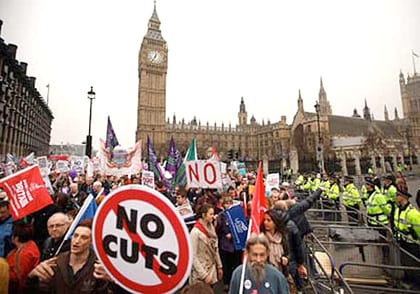
Van Jones, poster boy for the co-optist “99% Spring”. The man’s naked ambition reminds us of a younger Obama.
There is good news in the Boston Globe today for the managers, development directors, visionaries, political hacks and propaganda flacks who run “the Progressive Movement.” More easy-to-earn and easy-to-hide soft money, millions of dollars, will be flowing to them from super rich Democrats and business corporations. It will come clean, pressed and laundered through Organizing for Action, the latest incarnation of the Obama Money Machine which has recently morphed into a “nonpartisan non-profit corporation” that will ‘‘strengthen the progressive movement and train our next generation of leaders.’’
Does this information concern you? If not, you need to get out of the propaganda bubble of your Progressive Movement echo chamber and think. Think hard. Think about fundamental, radical, democratic, social and economic change, who might bring it about and how. Ask yourself if the the rich elite, the 1%, are going to fund that. Leave The Nation and Mother Jones on the shelf; turn off Ed Schultz, Rachel Madow and Chris Hayes; don’t open that barrage of email missives from Alternet, Media Matters, MoveOn, and the other think tanks; and get your head out of the liberal blogosphere for a couple days. Clear your mind and consider this:
The self-labeled Progressive Movement that has arisen over the past decade is primarily one big propaganda campaign serving the political interests of the the Democratic Party’s richest one-percent who created it. The funders and owners of the Progressive Movement get richer and richer off Wall Street and the corporate system. But they happen to be Democrats, cultural and social liberals who can’t stomach Republican policies, and so after bruising electoral defeats a decade ago they decided to buy a movement, one just like the Republicans, a copy.
The Progressive Movement that exists today is their success story. The Democratic elite created a mirror image of the type of astroturf front groups and think tanks long ago invented, funded and promoted by the Reaganites and the Koch brothers. The liberal elite own the Progressive Movement. Organizing for Action, the “non-partisan” slush fund to train the new leaders of the Progressive Movement is just the latest big money ploy to consolidate their control and keep the feed flowing into the trough.
The professional Progressive Movement that we see reflected in the pages of The Nation magazine, in the online marketing and campaigning of MoveOn and in the speeches of Van Jones, is primarily a political public relations creation of America’s richest corporate elite, the so-called 1%, who happen to bleed Blue because they have some degree of social and environmental consciousness, and don’t bleed Red. But they are just as committed as the right to the overall corporate status quo, the maintenance of the American Empire, and the monopoly of the rich over the political process that serves their economic interests.
Rich Democrats to Progressives: We Love You, Man!
After the 2000 presidential election, the Al Gore Hanging Chad Debacle, rich liberal Democratic elite began discussing, conspiring and networking together to try and make sure that no scruffy, radical political insurgency like the Nader 2000 campaign would again raise its political head. They generally loved Al Gore, the millionaire technocrat, and they put in play actions which led to the creation of a movement of their own that aped the right wing’s institutions. They reached out to the well-paid professionals who ran the big environmental groups they already funded and owned, and to other corporate reform and liberal media operations. They followed plans drawn up by Democratic Party insiders who wanted nothing more than to win elections, and who saw the need for the tools and groups and campaigns the Right wielded. They made it clear there would be wonderful financial rewards and career advancements for progressive leaders and their organizations who lined up with them.
The Progressive Movement we see today was created by a small group including Democratic political operatives and foundations including TIDES (formed in 1976), the millionaires and billionaires of the Democracy Alliance, (formed in 2005) and eventually the Obama machine.
After Al Gore’s 2000 debacle, the rich liberal Democrats in the East and the West began to talk and meet. The green elite funders and dot.com millionaires of the Bay Area solidified relationships with the Beltway think tanks, political consultants and and PR flacks. Liberal Democratic Party players like MoveOn’s co-founder Wes Boyd and TIDES Drummond Pike drew closer with others including the George Soros, John Podesta and Stanley Greenberg crowd. The Democratic Party defeats in 2002 and 2004 fueled further despair and solidified plans for the elite to build a new Progressive Movement that would serve their agenda.
This became very visible with the arrival of the Democracy Alliance. A summer 2005 article in the Washington Post made clear their intent to pour millions into creating and owning a Progressive Movement. Looking back, someone needs to give these folks an award because the wealthy elitists in the Democracy Alliance succeeded wildly, mission accomplished!
As the Washington Post reported, “at least 80 wealthy liberals have pledged to contribute $1 million or more apiece to fund a network of think tanks and advocacy groups to compete with the potent conservative infrastructure built up over the past three decades. … The goal of the alliance, according to organizers, is to foster the growth of liberal or left-leaning institutions equipped to take on prominent think tanks on the right, including the Heritage Foundation, the Hoover Institution, the American Enterprise Institute and the Cato Institute, as well as such training centers as the Leadership Institute and the Young America’s Foundation.”
The Washington Post explained, “There has been a flourishing of new, pro-Democratic think tanks and advocacy groups in recent years. Clinton administration chief of staff John D. Podesta established the Center for American Progress … and author David Brock helped create Media Matters for America last year, among others. All these groups are potential recipients of money from alliance partners. In addition, the number of liberal bloggers on the Web has been growing at a fast pace … . Jockeying for cash among possible recipient organizations has already begun. Robert L. Borosage, director of the liberal Campaign for America’s Future, said the alliance will fund a ‘set of institutions in this city to be in the national debate, and we would like to be one of them.’ ”
For almost a decade now the funders of the Progressive Movement, the rich Democrats of the Democracy Alliance and their cliques, networks and organizations, have employed and funded political hacks, fundraisers, pollsters, organizers and PR flacks. Over the past ten years they have dumped more and more money into the big feeding trough shared by the major players of the Progressive movement. The overall goal and result has always been to bring withering rhetorical fire and PR attacks upon the Republican Right, while creating a tremendous fear of the Right to increase the vote for Democrats. This has become Job #1 for the Progressive Movement. No one quite remembers Job #2.
Real movements are not the creation of and beholden to millionaires. The Progressive Movement is astroturf beholden to the rich elite, just as the Democratic millionaires and operatives of the Democracy Alliance intended. The “movement’s” funding is in the hands of a small number of super rich Democrats and union bureaucrats and advisors who run with them. Its talking points, strategies, tactics and PR campaigns are all at the service of the Democratic elite. There is no grassroots organized progressive movement with power in the United States, and none is being built. Indeed, if anything threatens to emerge, the cry “Remember Nader!” arises and the budding insurgency is marginalized or coopted, as in the case of the Occupy Wall Street events. Meanwhile, the rich elite who fund the Progressive Movement, and their candidates such as Barack Obama, are completely wedded to maintaining the existing status quo on Wall Street and in the corporate boardroom. Their well-kept Progressive Movement is adept at PR, propaganda, marketing and fundraising necessary in the service of the Democratic Party and the corporate elite who rule it.
One of the Progressive Movement’s key new movers and shakers is Ilyse Hogue. Her rise out of the green movement and into the highest echelons of Democratic power encapsulates how it all works. In 2006 Hogue was recruited out of Rainforest Action Network by Wes Boyd of MoveOn to run their national campaigns. Since then she has accumulated hats and desks at The Nation, Media Matters, the Soros-funded Super PAC Public Campaign Action Fund, and most recently the feminist lobby NARAL. Hogue is an articulate and well-rewarded spokesperson, fundraiser and mobilizer for the new Progressive Movement. Her network of recent employers all benefited nicely from the successful work of the Democracy Alliance, TIDES, MoveOn, and Soros. Anyone who wonders if there are good careers in the Progressive Movement can look at her and others and see the answer is clearly ‘yes’.
Every well-funded movement needs an echo-chamber to pump up its propaganda and messages, and for the Progressive Movement the Netroots Nation bloggers, The Nation, Alternet, Mother Jones, and scores of other journalists and pundits have filled the bill. The development of the messages and talking points of the Progressive Movement is the realm of DC think tanks and organizations such as Media Matters, and a small army of flacks is also utilized including PR maven David Fenton, pollster Stanley Greenberg and messaging guru George Lakoff.
Co-opting the Anti-War Movement to Win Elections
After the 2004 flop of the Kerry/Edwards campaign, luck shone on the Democrats. The over-reach of the neoconservatives, the failure to find those weapons of mass deception (sic), the endless wars in Iraq and Afghanistan, turned American public opinion, especially among the young, against the Republicans. Growing anti-war sentiment, which had little to do with the organized anti-war movement, delivered to the Democrats what Governor Mario Cuomo called “The Gift.” The horrific Iraq war, he explained to a Democracy Alliance gathering, was the gift that allowed the Democrats to take control of the US Congress.
It was at this point in early 2007 that the truly dark and cynical agenda of the professional Progressive Movement and the Democratic Party revealed itself. Under Pelosi the Democrats could have cut off funding for Bush’s unpopular wars and foreign policy. Instead, with PR cover provided by MoveOn and their lobbyist Tom Matzzie, the Democratic Congress gave George Bush all the money he wanted to continue his wars. For the previous five years MoveOn had branded itself as the leader of the anti-war movement, building lists of millions of liberals, raising millions of dollars, and establishing itself in the eyes of the corporate media as leaders of the US peace movement. Now they helped the Democrats fund the war, both betting that the same public opposition to the wars that helped them win control of the House in 2006 could win the Presidency in 2008.
Their bet paid off with a young, charismatic black candidate backed from his beginnings by Wall Street, and thus able to out-raise even the Clinton Machine for the big money provided by the Democratic elite. Obama hired top online organizers and combined MoveOn’s “clicktivist” style and expertise to both raise money and build an effective political machine. The stock market collapse of 2008 was again like a gift for the Democrats, showing Obama’s cool contrasted with old John McCain’s panic.
Just before the Obama victory in 2008, Alternet’s Don Hazen interviewed Drummond Pike, the millionaire who founded the TIDES Foundation in 1976 and a founding member of the Democracy Alliance. The topic was TIDES upcoming “Momentum” conference at a fancy San Francisco hotel. The exclusive confab was described as “an invitational gathering of progressive donors and advocates” where “some of the most creative minds in the progressive community come together to challenge, inspire and energize each other.” Pike said it was “where we bring funders, leaders of key nonprofits, think tanks and activist organizations together… We are engaged in philanthropy. We granted $93 million dollars last year and manage grant-making for more than 400 individual and institutional donors.” The wedding of the rich elite Democrats and the Progressive Movement just got better and better.
Occupying Occupy For Wall Street Democrats
After Obama’s 2008 victory the Progressive Movement celebrated itself and continued to solidify with ongoing funding from the Dem elite, playing a significant role in delivering the White House again to the Democrats in 2012. One of their 2012 PR front stunts to benefit the Democrats was launched in early 2012, the “99% Spring.”
In the Fall of 2011, the spontaneous street action known as Occupy Wall Street withstood media derision long enough to earn its respect. It’s images struck a chord during the recession. Overnight protests in major urban areas might not have appealed to the typical Democratic voter, but bashing the rich did. Occupy might have even threatened the Democratic Party had it ever been able to overcome its anarchistic roots and in some way produced a strategy and organization. But its slogan “we are the 99%” resonated widely.
Nothing succeeds like success, and imitation is the most sincere flattery. The Progressive Movement has plenty of bright marketers and messengers who saw the writing on Wall Street. They decided to launch and hype an election year PR campaign to co-opt the message and theme of Occupy Wall Street. They called it the 99% Spring, “Spring” as in the time of year but also as in Arab Spring of 2011. When you don’t have a real Movement of your own, at least cop good language from some others!
What amused me most about the 99% Spring was its simultaneous audacity and vacuousness, and how obviously it was a front for MoveOn, Van Jones, and the messaging agenda of the Democratic Party. And now it’s all gone, just a flash across the webpages of The Nation and Mother Jones, not even a website left behind with its web address up for sale to the highest bidder. The Progressive Movement lives from PR campaign and to PR campaign. When the money’s spent, the movement just pivots to the next bit of funding and a new campaign is launched.
I first heard of the 99% Spring in a February, 2012 email from the group formerly known as SmartMeme, activists who work with the Progressive Movement and develop “stories” that can be used to get everyone thinking alike in a positive way. They wrote: “This spring is our opportunity to take the the emerging movement for the 99% to next level by following in the foot steps of previous successful movements and prepare for organized campaigns of sustained nonviolent direct action. SmartMeme is one of the initiating organizations of 99% spring because we believe the best way to challenge the corporate stranglehold on our economy and political system is with organized people power!”
Propaganda is my beat, so I was not impressed by this revolutionary development. It sounded exactly as it was, a big flow of money into key Progressive Movement organizations to co-opt the brand of Occupy Wall Street movement for the Progressive Movement and the Democrats. In my email from SmartMeme there was a hotlink to the “the99%Spring” website. Today that link and URL goes to NameJet, a company that auctions off unwanted web addresses. How appropriate.
The MoveOn.org site on 99% Spring is still up as of this writing: MoveOn pushed 99% Spring hard, and emails from their staffers employed revolutionary hyperbole that might have made Abbie Hoffman proud. MoveOn wrote, “groups from every corner of our movement are joining forces to do something that’s never been tried before. During the week of April 9-15, across America, we will bring 100,000 people together for an unprecedented national movement-wide training on what happened to our economy, on the history of peaceful direct action, and how — following in the footsteps of Gandhi and Dr. Martin Luther King Jr. — we can take direct action this spring to challenge corporate power, end tax giveaways to the 1%, fight the influence of money in politics, and more.”
99% Spring organizers Liz Butler and Joy Cushman extolled similarly in their emails: “Imagine if the 99% of us for whom this country is supposed to work came together as a unified movement for democracy and justice? What could happen if hundreds of thousands of us were willing to take nonviolent direct action to reclaim the America we love from the banks and lobbyists who’ve stolen it from us? Let’s find out.”
The SourceWatch website: lists the groups promoting 99% Spring: “Jobs With Justice, United Auto Workers,National Peoples Action, National Domestic Workers Alliance, MoveOn.org, New Organizing Institute, Movement Strategy Center, The Other 98%, Service Employees International Union, AFL-CIO, Rebuild the Dream, Color of Change, UNITE-HERE, Greenpeace, Institute for Policy Studies, PICO National Network, New Bottom Line, Veterans of the Mississippi Civil Rights Movement, SNCC Legacy Project, United Steel Workers, National Education Association, Working Families Party, Communications Workers of America, United States Student Association, Rainforest Action Network, American Federation of Teachers, Leadership Center for the Common Good, UNITY, National Guestworker Alliance, 350.org, The Ruckus Society, Citizen Engagement Lab, smartMeme Strategy & Training Project, Right to the City Alliance, Pushback Network, Alliance of Californians for Community Empowerment, Progressive Democrats of America, Change to Win, Grassroots Global Justice Alliance, Campaign for America’s Future, Public Campaign Action Fund, Fuse Washington, Missourians Organizing for Reform and Empowerment, Citizen Action of New York, Engage, United Electrical Workers Union, National Day Laborers Organizing Network, Alliance for a Just Society, The Partnership for Working Families, United Students Against Sweatshops, Presente.org, Get Equal, American Federation of State, County, and Municipal Employees, Iowa Citizens for Community Improvement, Corporate Accountability International, American Federation of Government Employees, Training for Change, People Organized for Westside Renewal (POWER), Student Labor Action Project, Colorado Progressive Coalition, Green for All, DC Jobs with Justice, Midwest Academy, The Coffee Party, International Forum on Globalization, UFCW International Union, Sunflower Community Action, Illinois People’s Action, Lakeview Action Coalition, Progressive Leadership Alliance of Nevada, International Brotherhood of the Teamsters, Resource Generation, Highlander Research and Education Center, TakeAction Minnesota, Energy Action Coalition, Earthhome.us.”
In any good front group campaign lists like this serve a few purposes. One is to give the impression that this is a really powerful and diverse effort with scores of leading organizations actively involved, rather than a well-funded PR effort run by a small group at the top, which it was. Another purpose is to demonstrate that there is money behind this effort and that the major Progressive Movement hitters are involved. When I saw the list I sent some emails to Progressive Movement activists asking why they were lending their names to a MoveOn-driven effort to co-opt the Occupy Wall Street for the Democrats.
Greenpeace’s Executive Director wrote back, clearly not sharing my view. He said “something funny is happening here. In a fascinating, good, confusing way.” He believed that MoveOn and the public employee union SEIU were “focused on scaling civil disobedience. That’s different. You can look at it in many ways. … Friends asked us to sign on, we do that a lot.”
An employee of Campaign for America’s Future also gave 99% Spring a big left-handed thumbs up, writing me, “this is a ton of progressive groups trying to get a national movement going, organized, working together,” and “anything that drives the 99% versus 1% perspective advances everything we are trying to achieve.”
No one identified with the Progressive Movement would in any way question or criticize the 99% Spring, at least no one I could find. And then my inquiries uncovered someone new who has a paid position in one of the groups. She agreed generally with my perspective, and was disgusted by what she saw daily from her “movement”: pandering to the rich elite; shallow public relations campaigns substituting for organizing; Democratic Party agendas; six figure salaries and consulting fees for the Progressive executives and consultants, and so on. She saw the Progressive Movement a convenient way for the Democratic rich to control the rabble, manage dissent, and deflect attention from the need for fundamental, radical structural change in the United States.
Eventually she wrote an article under the pen-name Insider for CounterPunch exposing the 99% Spring as a front group for the agenda of the Democrats, organized largely by MoveOn. The Insider’s piece hit a nerve or two and gathered quite a bit of attention and clumsy efforts at rebuttal.
I bounced the piece around and became its defender and promoter. She quoted me in her article. I told her that the 99% Spring reminded me of the AAEI coalition, another MoveOn front that worked with Nancy Pelosi in 2007 to see to it that the Iraq war was funded and used as a political stick to beat Republicans in 2008. Or the massively funded Health Care for America Now coalition backed by MoveOn in 2009 which made sure that single payer health care was ignored while the White House pushed its pro-insurance industry legislation derided as ‘Obamacare’.”
Keep Hope A Jive
Predictably the echo chamber of the Progressive Media – bloggers, columnists and editors at The Nation, Mother Jones and Alternet and elsewhere who get funding from the Democratic Elite — defended the honor of 99% Spring. The Nation produced a special issue promoting it. A Mother Jones writer claimed that it was an indication that Occupy Wall Street had co-opted MoveOn.
Some of the idealistic young green activists employed by 350.org bought heavily into 99%. That inspired Insider to take a critical look at 350.org as a tool for Obama’s re-election.
Eventually, like all PR campaigns when the funding runs dry, the 99% Spring simply dried up and blew away. It was nothing real, just election year pageantry from a Progressive Movement that — as the rich of the Democracy Alliance planned — would be a way to breathe some life into the morbid Democratic Party. The 99% Spring showed again that the Progressive Movement primarily exists to stick it to the Republicans, the a mirror image of their think tanks, echo chamber media, and PR fronts that rich Democrats have created or funded.
RIP 99% Spring. It was what we thought it was, all theater, and co-optation, all about getting Van Jones more publicity to promote Obama.
Will any of the paid professional Progressives ever admit so? Not as long as their careers and funding depend upon it; they can’t afford to take off their rose-hued glasses.
More importantly, how do people who aren’t the kept, professional Progressives go about asking the right questions, organizing the right ways, and making the fundamental, radical structural changes that will topple the institutional control of the 1% over our lives, communities, politics and biosphere?
I posed that question to someone not fooled by the foibles and feints of the Progressive Movement, my colleague Patrick Barrett, a University of Wisconsin academic who studies social and political movements. A veteran of the 1960s civil rights and anti-war movements, Patrick has never swooned to the spell of the Progressive Democrats. Patrick is one of the few truly wise people I know.
“What gets lost in all this faux movement politics,” said Barrett, “is any real challenge to the growing imbalance of social, political and economic power. Quite the contrary, the ultimate impact of their actions is to reproduce if not aggravate that imbalance. What we’ve got here is a deeply symbiotic relationship between a pseudo-movement that derives its raison d’etre and financial vitality from a vilification of the right, which it has helped to create and without which it would have no reason for existence. Indeed, the more extreme the right becomes, the better it is for them, since they live off of fear-mongering. To oppose the right in a meaningful sense would put them out of business. That isn’t to say that there is nothing to be feared in the right or that some of these folks don’t think they’re fighting the good fight, but rather that the two work in tandem, much like a good-cop-bad-cop team. As the right becomes ever more extreme, this Democratic Party cum non-profit industrial complex moves further and further to the right itself, thereby giving the Republicans and their ilk ever greater leash and making it easier to frighten the “progressive” masses.”
Barrett concluded, “Lest anyone think that this is some kind of conspiracy theory, it’s important to emphasize that this is primarily a function of social and economic structures and political institutions that create a market for these sorts of pseudo-movement leaders, who will flourish if the conditions are right. That’s why we need to focus our attention on altering those conditions, something these people have little or no interest in doing.”
ABOUT THE AUTHOR
John Stauber is an independent writer, activist and author. His books include Toxic Sludge Is Good for You, Mad Cow USA and Weapons of Mass Deception. In 1993 he founded the Center for Media and Democracy to exposed corporate, political and media propaganda campaigns. He retired from the Center in 2008. http://www.linkedin.com/in/johnstauber.








Comments
#2 Skylark 2013-04-02 11:45 EDT
Uniting Non-Owners/Employees/Workers
Bravo Chris! This is a practical and do-able approach to the current situation – the on-going, intensifing power/money ‘grab’ of the 1%.
Non-violence, as Dale writes, is also essential. Re-enforcing non-violence as a fundamental principle of action and protest requires talking about and mentioning at all gatherings, actions and protests.
Words are important and I would like to suggest three additions to rhetoric on the left that I think will resonate with the 99%.
1. Employee, ie., begin always saying/writing ‘workers & employees’, or ‘workers/employees’. ‘Working for someone else’ is also a good phrase. ‘If you work for/are employed by someone else…’ works as a call to all people in the 99%. (For better or worse, ‘worker’ is seen as a term exclusive to the left).
2. Responsible, ie. talk about ‘responsible government’, defining this as a government that responds to ALL citizens, from the smallest child to the oldest adult. Using the term ‘responsible government’ as a defining demand enables the use of a question like ‘don’t you believe in responsible government?’, ( a strong, repeatable rhetorical phrase & a sound-bite for the media), with which to confront such statements as, ‘we can longer support public health care’. We want and ask our children to be responsible. Why shouldn’t we ask this of our politicians?
3. Respect, ie. asking for respect to and from others/all people, instead of asking for dignity. Respect is a well defined behaviour. Again, we ask it from and teach it to our children and must ask it from politicians, corporate CEOs, etc..
To a peaceful, responsible future!
#1 Dale Dewar 2013-04-01 08:31 EDT
Uniting the Left
Not mentioned in this article – and often not mentioned at all in organizing protests, rallies, meetings – is the fact that to attract that vast middle ground, we have to be non-violent. Which means that we have to “police” ourselves – we cannot provide opportunity for the status quo, the wealthy, to unleash their trained dogs in uniforms. The vast unhappy disenfranchised middle class will stay home unless we can guarantee that the struggle is non-violent.
I know that this is a bit of a problem to many angry activists. But breaking one window, looting a bunch of stores, turning over one police vehicle will not make the movement for a new society any stronger. We avoid discussing the importance like this like the proverbial “elephant in the room”. How does the media recall the environmental rally in Quebec – by the number of people that were there? No, by the fact that there was violence – which effectively destroyed future participation by the vast majority of environmentalists. We must “get with the program”.